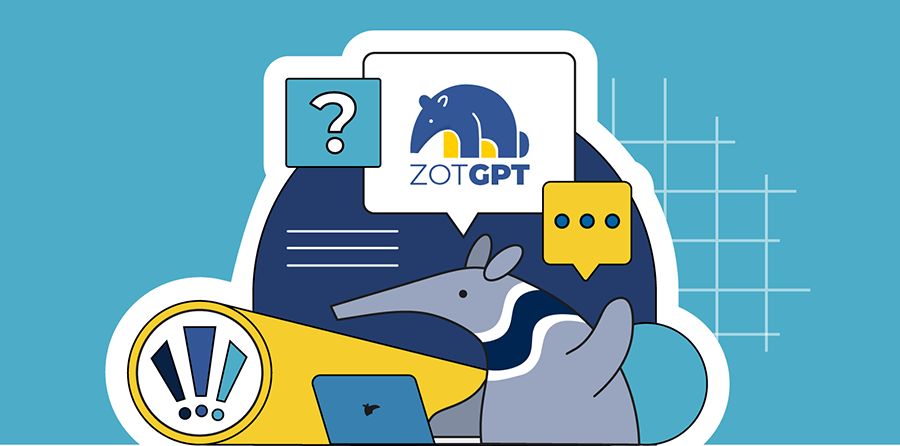UC Irvine Embraces AI with Launch of ZotGPT for Students

On April 30, UC Irvine announced the launch of ZotGPT Chat for students. Custom-made to support UC Irvine's emerging generative AI needs, ZotGPT is UCI's answer to the data privacy and governance concerns regarding third-party AI services, while still offering users the capabilities found in the latest GPT large-language models. In contrast to the free, widely-released version of ChatGPT, ZotGPT chat offers file uploads, text extraction from PDFs, and contains information updated to April 2023, compared to ChatGPT's data cutoff of September 2021 with the GPT-3.5 Turbo model. All of this functionality is brought to ZotGPT by Microsoft Azure AI, Amazon AWS and GPT-4 Turbo, with continual updates to come as the technology improves over time.
ZotGPT makes all of these GPT capabilities, currently available to paid ChatGPT Plus users and those running a demo of ChatGPT's GPT-4o language model, widely available to UCI users for free; bringing feature-rich AI functionality that rivals existing services, while keeping all user-submitted data secure to university servers and out of the hands of third-parties. This means that no outside vendors will be able to access any user data to train other AI models, and any confidential, personal or institutional information submitted through text or files will be kept secure within the University's walls.
Initially available as a beta program to only faculty and staff since March, students have quickly gravitated toward the chatbot following its launch. Tina Tsai, a '26 Business Information Management and Software Engineering double-major student, tells me ZotGPT is now her 'main AI chatbot', saying "the responses [ZotGPT] gave me are worded better than my ChatGPT-3.5 and more accurate. I have [already] been suggesting to friends that [don’t] have ChatGPT-4 to use ZotGPT." And a student programmer who was interviewed revealed that ZotGPT's major privacy advantages and smarter responses has encouraged her to use the chatbot for more personalized tasks she hadn't tried before with AI, such as helping her outline cover letters and resumes.
UCI's development of ZotGPT signals that the University is exploring how higher education institutions can not only embrace but also harness generative AI to benefit the classroom. Tsai noted that from a student perspective, technologies such as AI and VR have the exciting potential to allow students to learn in more diverse formats outside of lectures and notes, expanding the boundaries of how students learn core concepts.
However, paralleling the unsettled state of AI development, students are coupling their enthusiasm towards AI with a hint of trepidation towards using university-run AI programs. Although both students interviewed expressed that UCI's eagerness to embrace cutting-edge technologies is a net positive for learning, they had concerns with not knowing who specifically at the university gets access to student-submitted data. In response, an engagement campaign slated for Fall 2024 will help assuage student fears and promote greater transparency between ZotGPT developers, students and other relevant stakeholders, showing UCI's commitment to accountable data governance in the midst of higher education’s shift towards adopting AI.
"Transparency is paramount when introducing generative AI tools, regardless of the constituency group," said Tom Andriola, Vice Chancellor for Information Technology and Data and Chief Digital Officer at UC Irvine. "We will increase our efforts to be transparent about how the tool works and spread the message that faculty and staff will not access ZotGPT queries."
Michael Dennin, Vice Provost for Teaching and Learning, expands on ZotGPT's dual goals of protecting both student and faculty interests. "On one hand, faculty can still determine whether ZotGPT or any generative AI resource can be used for coursework in their class. We are treating it like any tool, much like the graphing calculator. On the other hand, the data is secured. Students can be confident that their data is not used or accessed by anyone at UC Irvine or any technology partners."
The OVPTL Generative AI Advisory Group has published various materials that encourage faculty to consider both the promise and the perils of generative AI in the classroom.
The launch of ZotGPT represents an exciting milestone in the legitimacy and adoption of generative AI usage in higher education. As a newly released generative AI service that relies on everchanging information, updates to ZotGPT and its functionality are promised to come. In addition to ZotGPT, UC Irvine has also partnered with third-party vendors to bring their AI services to faculty, staff and students, including Microsoft Copilot, Google Gemini and Zoom AI; highlighting our commitment to being a model university in the usage of generative AI.
For more information on ZotGPT and UC Irvine’s generative AI usage guidelines for faculty and students, visit the ZotGPT website.